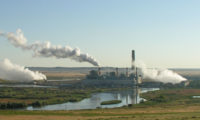In a blow to industry, a three-judge panel from a federal appeals court has upheld an Environmental Protection Agency’s rule governing air emissions of mercury and other hazardous pollutants.
The next step in the case for the energy companies, states and industry groups that challenged the EPA rule could be an appeal for a re-hearing by the full court. According to at least one of the parties in the case, a decision has not yet been made on an appeal.
The complex case centered on whether EPA acted appropriately in issuing the mercury and air toxics standards (MATS) without taking costs into account.
Industry groups, states and utilities said that EPA had exceeded its authority; EPA, the American Academy of Pediatrics and several environmental groups argued that the regulation could save up to 11,000 premature deaths every year.
The panel from the U.S. Court of Appeals for the District of Columbia on April 15 handed down a 2-1 ruling that said that EPA had the authority to issue the rule without considering the costs to comply.
But Judge Brett M. Kavanaugh, in his dissent, wrote, “In my view, it is unreasonable for EPA to exclude consideration of costs in determining whether it is ‘appropriate’ to impose significant new regulations on electric utilities.”
Joy Yearout, a spokeswoman for the Michigan Attorney General Bill Schuette, said, “While we're disappointed with Tuesday's ruling, we are heartened by Judge Kavanaugh's strong dissent, which recognized that EPA illegally and unreasonably failed to consider the real costs associated with this policy.” Yearout added, “We are reviewing the opinion and considering our options in consultation with other states.”
The standards would impose stringent emissions limits for mercury, hydrogen chloride, sulfur dioxide and particulates at new coal-and oil-fired plants that could be reached using maximum achievable control technology. EPA finalized the standard in 2012, but updated the emissions limits in 2013. Affected powerplants must begin achieving the reductions by the first quarter of 2015.
A wide range of industry groups had challenged the rule. Heath Knakmuhs, senior director of policy at the U.S. Chamber of Commerce’s Institute for 21st Century Energy—which filed an amicus brief on behalf of industry petitioners—said that the costs to implement EPA’s standard are “grossly disproportionate to the incremental benefits” they would provide to electric utilities.
“Because of [the standards], plants are now slated for closure that were needed during this past winter to keep homes heated—with no backup sources available,” he says.
Environmental groups praised the ruling. Fred Krupp, president of the Environmental Defense Fund, which was a party to the case, said, “The court recognized that mercury and other dangerous air toxins from coal-fired powerplants are a threat to public health, and that we should all be protected from them.”



Post a comment to this article
Report Abusive Comment